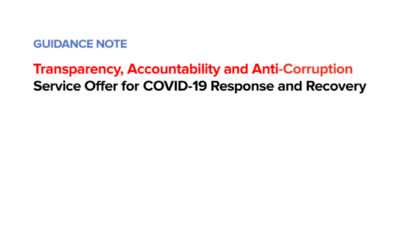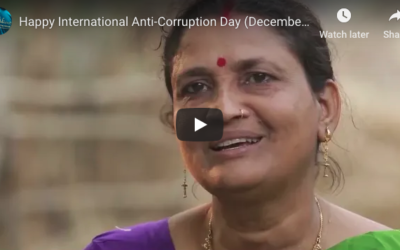Today, the majority of the world’s population lives in cities. This poses great challenges but also brings big opportunities. With good management, cities can work as engines of growth and incubators for innovation. They can also serve as job providers, build sustainability and fight inequality.
On the other hand, corrupt cities could also transfer resources from the public to the elites, and generally from the poor to the rich, worsening urban inequity.
How can we thus ensure that urban governance delivers resources and services in a transparent, accountable way?
To answer this question and others, two weeks ago UNDP’s Global Anti-corruption Initiative, UNDP Colombia and the Bogota Chamber of Commerce organized a policy dialogue at the 7th World Urban Forum (WUF7) in the city of Medellín, Colombia.
The event, which took place in a traditional Maloca (a long house used by the natives of the Amazon as the centre of the village government) brought together government representatives, mayors, academics, the private sector, and UN officials to discuss how cities can fight corruption more efficiently to contribute to urban equity.
One takeaway from the dialogue was that “the end cannot justify the means.” As long as corruption prevails, sustainable development of cities may prove elusive. Corruption in cities takes places when political leaders cross ethical lines or compromise their integrity to access power or to justify the use of power and resources to achieve urban development without respecting accountability or decision-making processes. Once this happens, democracy at the local level cannot function, as public trust in politicians is damaged.
The dialogue also highlighted the need to demand more opportunities for civil society, women and youth networks to take an active role in local and urban governance. As one panelist emphasized, we need “more eyes and fewer hands” in decision-making processes. When our local representatives act transparently, when we have tools and means to see what they do, we can make informed choices when we vote, holding them accountable for their actions.
Finally, relevant national strategies (such as the judicial sector, public administration reform, and open government) should be reinforced at the local level to make anti-corruption efforts more effective. At the moment, anti-corruption strategies at national and local levels seem to be working in parallel.
Written by Anga Timilsina, Programme Manager, Global Anti-Corruption Initiative (GAIN), UNDP. This article originally appeared in http://www.undp.org/content/undp/en/home/ourperspective/ourperspectivearticles/2014/04/24/fighting-corruption-and-urban-inequality-anga-timilsina/




